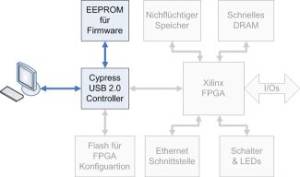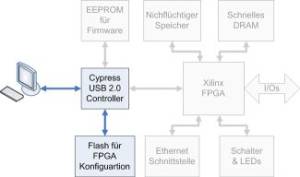Command reference
Following is the list of all commands that are understood by the GECKO3COM system and can be executed over USBTMC.
SCPI commands
General
*rst, reset command. On the GECKO3COM this resets the FPGA and all GECKO3 modules*cls, clear status command*ese, standard event status enable command*ese?, standard event status enable query*esr?, standard event status register query*idn?, identification query*opc?, operation complete query*opc, operation complete command*sre, service request enable command*sre?, service request enable query*stb?, read status byte query*wai, wait-to-continue command
System
syst:err?, returns an error message if there is one. Returns 0, “No Error” when the last command was successful.syst:vers?, returns the SCPI standard version number the device is using.
FPGA
fpga:conf <fpga configuration data>, configures the FPGA with the following data from a bitfile. If the FPGA type found in the bit file header does not match with the on-board FPGA type the FPGA will be untouched (It keeps his configuration and is working uninterrupted) and the command execution error flag is set.fpga:type?, returns the FPGA type as a string.fpga:id?, returns the JTAG ID code of the FPGA as a string of Hex digits representing a 32bit integer number.fpga:done?, returns 1 when the FPGA is configured else 0.fpga:data, context switch to the FPGA. After this command you communicate directly with the FPGA. The GECKO3COM firmware does not interpret commands anymore! If the FPGA is not configured (fpga:done? returns 0) then no context switch is done and the command execution error flag is set.
Memory
mem:data 0|1 <fpga configuration data>, stores a fpga configuration file (bit file) in the selected slot. Which configuration file is loaded on start up is determined by a dip switch on the GECKO3main.mem:del 0|1, deletes the stored bit file from the selected slot
Examples
*idn?
Returns the identification string in the form of <manufacturer>, <device type>, <serial number>, <firmware version> of the GECKO3COM system.
Example response: MicroLab BFH-TI,GECKO3COM,23,0.4
fpga:conf
This command allows you to test an FPGA program without saving it on the GECKO3main module (your program is only written to the FPGA, not into the SPI Flash).
After a reset or power down is your program gone. The FPGA program has to have a .bit extension.
Command: fpga:conf <fpga configuration data>
mem:data
This command writes your FPGA program directly into the SPI Flash of the GECKO3main module. After a reset or power down the program is still on the GECKO3main and will be loaded into the FPGA at power up.
The FPGA program has to have a .bit extension.
Command: mem:data <slot> <fpga configuration data>
slot: 0/1
fpga:type?
Returns the FPGA type on these GECKO3main module. The return string is like the FPGA type string in the *.bit file header.
Example response: 3s1500fg676
Commands after the context switching
Once the context switching has happened the EZ-USB acts as a forwarder of all USBTMC packets to the FPGA.
The user has to implement the communication protocol on his own on the FPGA.
The GECKO3COM doesn't interpret the IEEE488 messages anymore.
To switch the context mode back where the EZ-USB interprets the commands the USBTMC control command INITIATE_CLEAR has to be sent.


